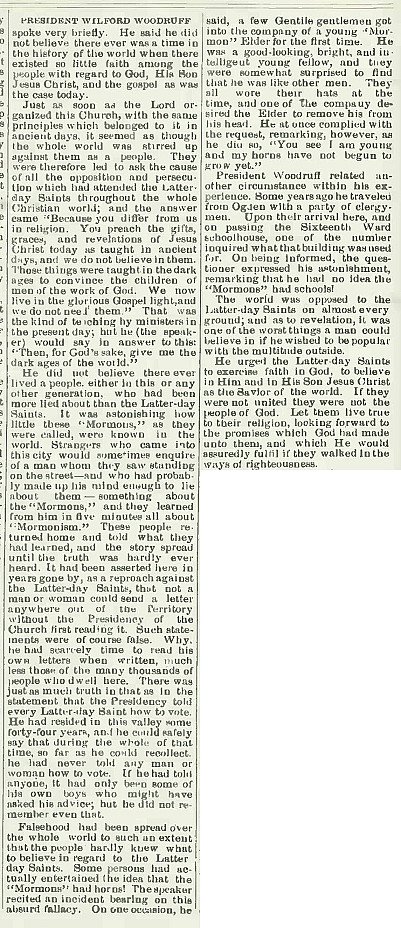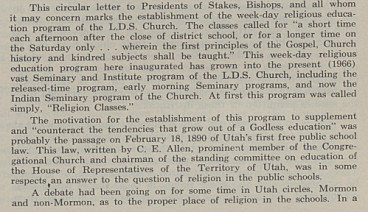PRESIDENT WILFORD WOODRUFF
spoke very briefly. He said he did
not believe there ever was a time in
the history of the world when there
existed so little faith among the
people with regard to God, His Son
Jesus Christ, and the gospel as was
the case today.
Just as soon as the Lord or-
ganized this Church, with the same
principles which belonged to it in
ancient days, it seemed as though
the whole world was stirred up
against them as a people. They
were therefore led to ask the cause
of all the opposition and persecu-
tion which had attended the Latter-
day Saints throughout the whole
Christian world; and the answer
came "Because you differ from us
in religion. You preach the gifts,
graces, and revelations of Jesus
Christ today as taught in ancient
days, and we do not believe in them.
Those things were taught in the dark
ages to convince the children of
men of the work of God. We now
live in the glorious Gospel light, and
we do not need them." That was
the kind of teaching by ministers in
the present day; but he (the speak-
er) would say in answer to this:
"Then, for God's sake, give me the
dark ages of the world."
He did not believe there ever
lived a people either in this or any
other generation, who had been
more lied about than the Latter-day
Saints. It was astonishing how
little these "Mormons," as they
were called, were known in the
world. Strangers who came into
this city would sometimes enquire
of a man whom they saw standing
in the street—and who had probab-
ly made up his mind enough to lie
about them—something about
the "Mormons," and they learned
from him in five minutes all about
"Mormonism." These people re-
turned home and told what they
had learned, and the story spread
until the truth was hardly ever
heard. It had been asserted here in
years gone by, as a reproach against
the Latter-day Saints, that not a
man or woman could send a letter
anywhere out of the Territory
without the Presidency of the
Church first reading it. Such state-
ments were of course false. Why,
he had scarcely time to read his
own letters when written, much
less those of the many thousands of
people who dwell here. There was
just as much truth in that as in the
statement that the Presidency told
every Latter-day Saint how to vote.
He had resided in this valley some
forty-four years, and he could safely
say that during the whole of that
time, so far as he could recollect,
he had never told any man or
woman how to vote. If he had told
anyone, it had only been some of
his own boys who might have
asked his advice; but he did not re-
member even that.
Falsehood had been spread over
the whole world to such an extent
that the people hardly knew what
to believe in regard to the Latter
day Saints. Some persons had ac-
tually entertained the idea that the
"Mormons" had horns! The speaker
recited an incident bearing on this
absurd fallacy. On one occasion, he
said, a few Gentile gentlemen got
into the company of a young "Mor-
mon" Elder for the first time. He
was a good-looking, bright, and in-
telligent young fellow, and they
were somewhat surprised to find
that he was like other men. They
all wore their hats at the
time, and one of the company de-
sired the Elder to remove his from
his head. He at once complied with
the request, remarking, however, as
he did so, "You see I am young
and my horns have not begun to
grow yet."
President Woodruff related an-
other circumstance within his ex-
perience. Some years ago he traveled
from Ogden with a party of clergy-
men. Upon their arival here, and
on passing the Sixteenth Ward
schoolhouse, one of the number
inquired what that building was used
for. On being informed, the ques-
tioner expressed his astonishment,
remarking that he had no idea the
"Mormons" had schools!
The world was opposed to the
Latter-day Saints on almost every
ground; and as to revelation, it was
one of the worst things a man could
believe in if he wished to be popular
with the multitude outside.
He urged the Latter-day Saints
to exercise faith in God, to believe
in Him and in His Son Jesus Christ
as the Savior of the world. If they
were not united they were not the
people of God. Let them live true
to their religion, looking forward to
the promises which God had made
unto them, and which He would
assuredly fulfil if they walked in the
ways of righteousness.






